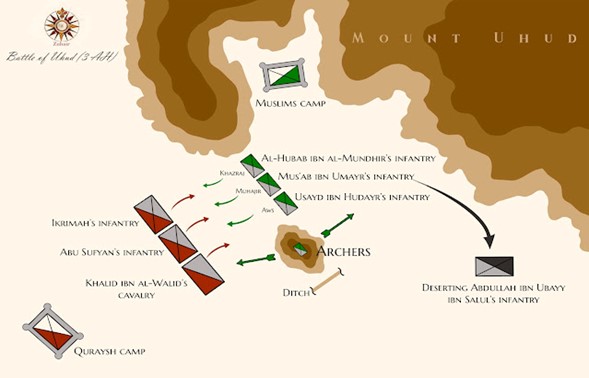Leadership Lessons from the Battle of Uhud
Abstract
 Abstract Views: 0
Abstract Views: 0
The current study aimed to probe into leadership lessons from the battle of Uhud by discussing the said historical event followed by the presentation of lessons. The first lesson learned from the battle is the importance of reliable information. When an information is confirmed to be accurate, the top management may plan how to react accordingly before discussing and deliberating on other options with the subordinates. The second lesson learned is that even when the management has different opinions and plans from what the leader has proposed, they must agree on a specific plan accordingly. The third lesson taught by the battle is to be the first-mover advantage in management. A company may outperform its competitors by being the first to market in a new product category. The fourth lesson maximises the advantage of a small group and follows the instructions based on a carefully laid out plan. The fifth lesson uses spiritual motivation to bring a sense of purpose that mobilises human potential in obedience to God’s guidance. The next lesson promotes important qualities of trustworthy followers, that is, obedience, courage, and jihadist mentality. The seventh lesson learned is the need to abide by the concept of “we hear and we obey” (sami’na wa ato’na) as a part of trust (amanah). The final lesson learned from the battle is that if one wants to engage in any endeavour, one must do so properly and leave everything to Allah (tawakkal ala Allah).
Downloads
References
Aflah, Kuntarno Noor., Suharnomo Suharnomo, Fuad Mas'ud, and Ali Mursid. “Islamic Work Ethics and Employee Performance: The Role of Islamic Motivation, Affective Commitment, and Job Satisfaction.” The Journal of Asian Finance, Economics and Business 8, no. 1 (2021): 997-1007. http://dx.doi.org/10.13106/jafeb.2021.vol8.no1.997.
Al-Asmari, Abdulaziz Abdullah. “Arab/Islamic Concept of Intelligence in the Case of Fatah Paramilitary.” PhD diss., Brunel University, (2009). https://bura.brunel.ac.uk/handle/2438/3590.
Ash-Shallabi, Ali Muhammad. Sejarah Lengkap Rasulullah, Jilid 2 [The Complete History of Rasulullah, Vol. 2]. Jakarta Timur : Pustaka Al-Kautsar, 2014.
Bekoglu, Filiz Bozkurt., and Ahu Ergen. “Art of War and its Implications on Marketing Strategies: Thinking like a Warrior.” International Journal of Research in Business and Social Science 3, no. 3 (2014): 37-47. http://dx.doi.org/10.20525/ijrbs.v3i3.108.
Cader, Akram Abdul. “Towards an Islamic Model of Work Motivation.” Intellectual Discourse 24, no. 1 (2016): 83-109. https://doi.org/10.31436/id.v24i1.750.
Eslake, Saul. The Importance of Accurate, Reliable and Timely Data. Rumbalara Football Netclub, 2006. https://www.anz.com/documents/economics/the_importance_of_data.pdf
Fuchs, Ben, and Robin Shohet. “Betrayal: an Inevitable Part of Leadership?." International Journal of Leadership in Public Services 8, no. 4 (2012): 232-236. https://doi.org/10.1108/17479881211323616.
Ghomari, Taibi. “Uhud, Battle of (625 C).” In Islam: A Worldwide Encyclopedia (4 Volumes), edited by Cenap Cakmak. ABC-CLIO, 2017.
Giles, Lionel, ed. Sun Tzǔ on the Art of War: The Oldest Military Treatise in the World. United States : CreateSpace Independent Publishing Platform, 2015.
Glassé, Cyril. The New Encyclopedia of Islam. Maryland : Rowman & Littlefield, 2013.
Goel, Kanika. Data Governance for Digital Trust. Final Report for Australia Retailer Association (Queensland University of Technology, School of Information Systems, Process Science Academic Group, 2022). https://research.qut.edu.au/ara-consumer-research/wp-content/uploads/sites/352/2022/06/ARA-report-Data-Governance-for-Digital-Trust.pdf
Halaychik, Corey. Lessons in Library leadership: a Primer for Library Managers and Unit Leaders. Elsevier Ltd., 2018. https://doi.org/10.1016/C2014-0-04679-5.
Haykal, Muhammad Husayn. The Life of Muhammad. United States : American Trust Publications, 1976.
Hogan, Robert and Joyce Hogan. “The Mask of Integrity.” In Citizen Espionage: Studies in Trust and Betrayal, edited by Ralph M. Carney, Carson Eoyang, and Theodore R. Sarbin. United States : Bloomsbury Publishing, 1994.
Ibn Ishaq. The Life of Muhammad A Translation of Ishaq’s Sirat Rasul Allah. With Introduction and Notes by A.Guillaume. Oxford University Press, 1955.
Ibn Qayyim, Al-Jawziyya. Al Zaad Al-Maad fi hadi khairil ibad [Provisions for the Hereafter from The Guidance of the Best of Slaves]. Madinah : Madinah Publishers and Distributors, 2003.
Mohamed, Yasien. “The Ethical Philosophy of al-Raghib al-Isfahani.” Journal of Islamic Studies 6, no. 1 (1995): 51-75.
Al-Mubarakpuri, Saifur Rahman. Ar-Raheeq Al-Makhtum [The Sealed Nectar]. Tranlated by Issam Diab. Riyadh : Maktaba Dar-us-Salam Publishers and Distributors, 2002
Onley, Dawn. “How Leaders can Make Better Decisions.” SHRM, August 19, 2019, https://www.shrm.org/topics-tools/news/hr-magazine/how-leaders-can-make-better-decisions.
Qadhi, Yasir. “Seerah of Prophet Muhammad 48 - Martyrdom of Hamza.” Uhud Part 3. Posted November 18, 2015. https://arqadhi.blogspot.com/2015/11/048-martyrdom-of-hamza-uhud-part-3.html.
Qadhi, Yasir. "Seerah of Prophet Muhammad 82 - Battle of Hunayn Part 1.” Virtual lecture, April 16, 2014. Posted April 23, 2014, by Dr. Yasir Qadhi. YouTube, 1:03:50. https://www.youtube.com/watch?v=n6W-GPxCbqw&t=86s.
Reina, Dennis., and Michelle Reina. Trust And Betrayal in the Workplace: Building Effective Relationships in Your Organization. 3rd ed. San Fransisco : Berrett-Koehler Publishers, 2015.
Suarez, Fernando., and Gianvito Lanzolla. “The Half-Truth of First-Mover Advantage.” Harvard Business Review, April 2005. https://hbr.org/2005/04/the-half-truth-of-first-mover-advantage.
Wibisono, Chablullah. “Determination of Leadership and Spiritual Motivation on The Performance of Employees through the Satisfaction of City Government Employees Batam, Indonesia.” Proceedings of International Conference on Business and Management Research (ICBMR 2017), Indonesia, November 8-9, 2017, 448-458. https://doi.org/10.2991/icbmr-17.2017.41.

Copyright (c) 2024 Amran Rasli, Salman Bashir Memon, Silvi Asna Prestianawati, Imelda Hermilinda Abas

This work is licensed under a Creative Commons Attribution 4.0 International License.

This work is licensed under a Creative Commons Attribution 4.0 International License. Authors retain copyright and grant the journal right of first publication with the work simultaneously licensed under a Creative Commons Attribution (CC-BY) 4.0 License that allows others to share the work with an acknowledgement of the work’s authorship and initial publication in this journal.







